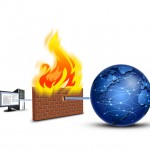 First, like a physical firewall that is built into a building to keep an actual fire out, an effective computing firewall will filter out most unwanted malware, viruses, Trojans, spyware and a host of other unwanted visitors. Secondly, just like security tags in a high-end clothing store will set off an alarm at the door if the tag isn’t removed, an effective computing firewall also helps to keep sensitive information inside the intranet or your personal computer by alerting you if any programs or malware try to transmit your information to an outside source.
First, like a physical firewall that is built into a building to keep an actual fire out, an effective computing firewall will filter out most unwanted malware, viruses, Trojans, spyware and a host of other unwanted visitors. Secondly, just like security tags in a high-end clothing store will set off an alarm at the door if the tag isn’t removed, an effective computing firewall also helps to keep sensitive information inside the intranet or your personal computer by alerting you if any programs or malware try to transmit your information to an outside source.
Here are the basic components of a firewall:
Packet Filtering – Packets of information entering or leaving the intranet are scanned by a defined set of administrator-defined rules and either accepted or rejected based on those rules.
Application Gateway – Security protocols are applied to specific applications.
Circuit-level Gateway – Security protocols are applied to an established TCP/IP or UDP connection. Once the connection has been scanned and verified, no further scanning is applied to information packet transmissions shared between the hosts.
Proxy Server – This intercepts all coming and going messages and effectively masks the actual network address.
The most effective firewalls will use several of the above-mentioned components to process incoming and outgoing information to protect your computers. Setting up your company’s firewalls can be somewhat confusing. The great news is that the experts at CCSI can help you set up a firewall that’s right for your company!



